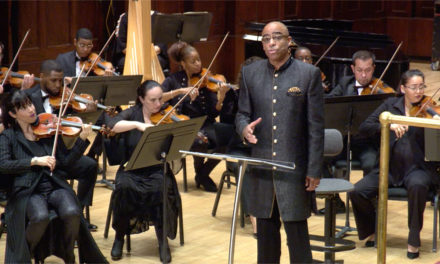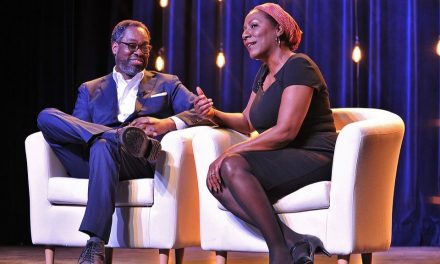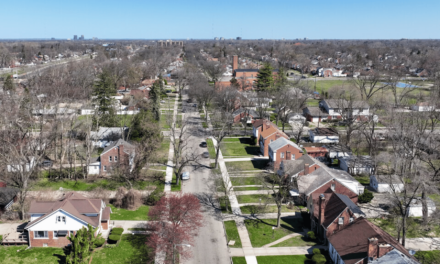Resistance and resilience have always been a part of the African American experience, and this year the Charles H. Wright Museum of African American History is celebrating Black History Month 2023 with the theme of “Black Resistance.” Through Feb. 28, The Wright Museum will host a variety of exhibits, events and programming that explore and celebrate African American history and culture through a “Black Resistance” lens.
RELATED: Charles H. Wright Museum kicks off President’s Lecture Series during MLK Day 2023
RELATED: The legacy of Dr. Charles H. Wright and his Museum
“American Black Journal” host Stephen Henderson sits down with the museum’s Exhibitions Manager Jennifer Evans to learn more about the museum’s special programming for Black History Month 2023. He gets the details about two major jazz-themed exhibits on display this month.
Plus, they talk about other family-friendly activities happening at The Wright, including Family Fun Day, a storytelling performance with the Detroit Association of Black Storytellers, and the Youth Speaks showcase.
Full Transcript:
Stephen Henderson, Host, American Black Journal: My favorite times of the year at the Wright because it’s Black History Month, of course. And the right always goes to such great lengths, I think, to make it clear that while we wish people were more attentive to the idea of black history all year, this is a special month and it’s an opportunity to really focus people’s attention on black history and celebrate the idea of black history. So, tell me what people should be excited about this month here in February 2023.
Jennifer Evans, Exhibitions Manager, Charles H. Wright Museum: Absolutely. So, we have two great exhibitions on show right now that are running through the end of the month. So, people can come down and see those. They’re both related to jazz music. One of them is pulled from the Bank of America collection that’s called ‘Jazz Greats’, and it’s a wonderful collection of black and white photographs that captures really the most famous jazz musicians, performers. People like Duke Ellington, Cab Calloway. It’s a great exhibition. It’s also a classic photograph.
It’s an art of photo taking and printing that we really don’t do anymore because now we’re so enamored with the digital world, so, it’s kind of a lost medium. The other exhibition was created by the Wright Museum Curatorial team. This is called ‘Detroit Jazz: The Legacy Continues’, and this is also, of course, about jazz music, but it focuses specifically on the Detroit musicians that played here. From as early as the early 1900s up until the 80s and 90s, and musicians that are still, of course, playing today. It really focuses on people that you can go and see you perform live today, people that perform at the Detroit Jazz Festival or around local places like Baker’s Piano Bar in Detroit.
Stephen Henderson: Yeah. So, the focus on jazz is really appropriate, of course, but also really interesting given that this is Detroit and that we have such a rich history with not just jazz musicians but, of course, jazz clubs, jazz recordings. It’s such a key part of Detroit history. Talk about how you settled on that for the theme of this year’s exhibits.
Jennifer Evans: Well, I think you really hit the money there. Really music in general is a wonderful expression in African-American culture, also in American culture. But I think Detroiter, specifically Detroit musicians, use Detroit as kind of a training camp. A lot of musicians would come to Detroit to learn an improvisational style. They would learn about black culture. But there was also kind of an informal style of learning here that they couldn’t get anywhere else.
And so, that’s a big part of the exhibition, why musicians were attracted to Detroit, but then why they would go out someplace else. Think you can make big money in some places like New York City or traveling that music circuit, that tour circuit. But a lot of musicians would come here to have that informal training where they would have mentorship. They could just play in someone’s basement, you know, and kind of have this great close connection with the music. And they can also really find a lot of freedom of expression, freedom of access to different kinds of places and styles. Detroit is really situated nicely in that history.
Stephen Henderson: Yeah. One of my favorite stories about Miles Davis is about the time he spent here playing at the Bluebird Lounge and how it changed the trajectory of his writing, of his playing and kind of changed the place that he had in jazz history. So that’s just one example of the really great history that we have here. We’re halfway through almost the month. Talk about the things that people can come do and see, events-wise, at the museum in the last part of Black History Month this year.
Jennifer Evans: So, we do have some film festivals and some screenings we are doing coming up. ‘Ron Carter: Finding the Right Notes’ is a film screening that’s happening on February 19th. We have the Wright Family Fun Days, which is something that is happening on Sunday, February 18th. So, there’s a lot of different kind of family programs. The Wright Family Fun Day is a reoccurring family programming that’s happening on Sundays for the month of February. I think that’s a great opportunity to come and see the exhibitions, the two that we’ve just talked about, but also to kind of explore what other things are happening at the museum.
I was going to talk about the glimpses of ‘And Still We Rise’, but that’s a virtual program, so it’s not really something that people can come here for. But it’s a great way to connect to the ‘And Still We Rise’ exhibition, which is our core exhibition. And it’s a deep dive into that exhibition. So it’s 22 galleries, of course, it’s a lot of information. But the glimpses of ‘And Still We Rise’ helps visitors kind of hone in on a person, a specific person, an event, something where perhaps ‘And Still We Rise’ just touches on it. But then, you get a 45-minute virtual presentation to really understand who is this person, why was this important, and then it helps people to get more information about that if they want to then explore on their own in deeper detail.
Stephen Henderson: The Family Fun Days, the idea of Black History Month as a time to welcome families into the museum, and in some cases, get children their first exposure to the riches that we have, the cultural riches that we have at the Wright. It’s one of my favorite parts of the celebration every year. We want to encourage everybody to go out and see the Wright and explore the Wright during Black History Month. Jennifer Evans, it was really great to have you here talking about all the great things that are happening. Thanks for joining us on American Black Journal.
Jennifer Evans: Thank you so much. I appreciate it.
Stay Connected:
Subscribe to Detroit Public Television’s YouTube Channel & Don’t miss American Black Journal on Tuesday at 7:30 p.m and Sunday at 9:30 a.m. on Detroit Public TV, WTVS-Channel 56.
Catch the daily conversations on our website, Facebook, Twitter and Instagram @amblackjournal.
View Past Episodes >
Watch American Black Journal on Tuesday at 7:30 p.m. and Sunday at 9:30 a.m. on Detroit Public TV, WTVS-Channel 56.




